Have you ever tried jasmine tea? If you are, you absolutely remember the powerful fragrance left in the mouth.
Many people may think, “what an amazing herbal tea! ” to describe the jasmine tea. Here is a little mistake, even jasmine tea has a floral scent, but it is not a herbal tea. In fact, jasmine tea is a unique scented tea.
What Is Jasmine Tea
Jasmine also knows as Jasminum, origin in Europe. It has two common types – Common Jasmine (Jasminum Officinale) and Arabian Jasmine (Jasminum Sambac), both in the olive family.
As the Buddhist holy flower, jasmine came to China with Buddhism. In the Ming Dynasty, Fujian Province people began to use jasmine to manufacture tea.
Scented tea was popular at that time. Chinese people love to combine the tea leaves and petals, infuse the aroma to the tea. In that way, the tea brewed with a delighting floral fragrance. And jasmine tea was the most loved one, due to its intoxicating scent and delicate taste.
Different from herbal teas, flowers or herbs are not the main components of scented jasmine teas, but loose leaves. Most of the basic-tea leaf is green tea and oolong tea, white tea is lesser, and black tea is least.
We know that in Western Countries, the popularity of the tea began with black tea. But historians found that Jasmine tea might comes into western earlier than black tea.
Under some historical reasons, the quality of jasmine tea exported from China was declined, and it replaced by the favorite black tea of British. Even though it not as famous as other types of tea, it still has numerous fans all over the world.
How Jasmine Tea Made
Manufacturing jasmine tea it’s a difficult job for the tea master. To infuse the aroma to the loose tea maximize, timing control needs to be very precise.
Jasmine only blooms in July and August, the hotter the climate, the more fragrant the jasmine. To make the best tea, that’s the best time.
- Picking. Jasmine for tea making must be flower-bud that has not yet bloomed, and the best time to pick it is 2 P.M., the aromatic oil content is highest at that moment. If it rains, picking work should put off until two days after the weather clean up.
- Air dry. The jasmine flower after picking should have air dry for hours to remove the herbaceous flavor away and keep them alive.
- Scenting. 0 A.M. coming, the jasmine blossom and the tea masters start to do the scenting job. They stacked jasmine flowers and loose green teas layer by layer. During this time, the flowers fragrant came to the highest-tier, and the dried green tea leaves begin to absorb the aroma. And this job should finish in a short time.
- Stir. After scenting for 4 or 5 hours, at about 5 A.M., tea masters need to stir the jasmine tea pile, to give more fresh air and let the temperature down, prevent quality damage by the high temperature.
- Baking. Till to 12. A.M, the first scenting job is done. The tea master will throw the jasmine petals away, and baking the green tea to dry the water it absorbs from the petals blooms, waiting for the next scenting.
Yes, the scenting job needs to repeat times, typically 7 times. The more times it did, the more fragrant it gets. Even though gets the help with the machine in the modern time, it still needs the tea master with lots of experiences to supervise all the process. One little mistake may do hard damage to the quality of jasmine tea.
Generally, jasmine tea only contains loose leaf. But some tea master, left some dried jasmine flowers in it, to make more fragrance when brewing.
How Much Caffeine Jasmine Tea Contented
The basic tea with jasmine tea is true tea(made from Camellia sinensis), so it contents caffeine naturally. Due to there are various types of basic tea, it is hard to say the exact amount of caffeine jasmine contains. From experience:
- Jasmine green tea is the primary type of jasmine tea. It contains about 35mg of caffeine per cup (typical size)
- Jasmine black tea contains about 50-90mg of caffeine per cup.
- Jasmine oolong tea contains the less, about 30mg.
- Jasmine white tea leaves at least contain about 6mg caffeine per cup.
The exact amount of caffeine in jasmine tea also depends on several factors, such as the tea processing way and the tea brewing way.
For example, tea bags usually contain more caffeine than whole leaves tea, because the fine tea in the tea bags has a faster dissolve rate. Also, a long steeping time can increase the caffeine amount of tea. If you mind the caffeine content, decaf jasmine tea on the market to choose.
For more information, read Factors Influence Caffeine In Tea.
Jasmine Tea Types
Jasmine teas classified into several types, and they got their own taste and appearance. Here are three most typically:
- Jasmine loose leaf tea. The most traditional and common type. It has both strong flavor, aroma, and a reasonable price.
- Jasmine dragon pearls. The jasmine tea shaped like a pearl. When you are brewing it, the jasmine pearl tea will blossom in the water, just like flowers. At first brewing, the jasmine fragrance comes more, and less tea taste; keep brewing, the tea leaves stretch, and more tea flavor comes.
- Jasmine silver needle. Not the same as the silver needle in white tea, jasmine silver needle is not white tea but green tea. Due to the basic green tea made from tender buds have a needle appearance, so got the name. And we know the tenderer the tea, the higher grade is, so Jasmine silver needle is a high-quality jasmine tea.
What Is Jasmine Tea Good For
Most of the jasmine tea health benefits are from the basic true teas, which contain a powerful ingredient called tea polyphenol. Some ingredients in tea polyphenol may different in different types of tea, but the benefits it brings are similar.
Skin Beauty
Tea polyphenol is a potent antioxidant, it against peroxy radicals and slow the skin from aging. And it also got an anti-inflammatory effect, reduce the risk of dermatitis. It may help skin repair the damage from UV.
Relax
What I experience, even though the caffeine will stimulate the nerve, the light jasmine tea just makes me sober up but not getting high.
With the fresh, delighting jasmine fragrance, make me feel close to nature. Drinking jasmine tea is the typical way I get rid of sleepiness and relaxation.
Weight Loss
We know that green tea is an effective weight-loss beverage, so as the jasmine tea.
Thanks to the synergy of EGCG and caffeine, jasmine tea can inhibit the activity of digestive enzymes in the gastrointestinal tract, and decrease the absorption of carbohydrates. They also boost lipid metabolism and reduce cholesterol content in blood and liver.
Daily jasmine tea drink may help your weight-loss aim if you don’t like the herbaceous taste of green tea.
Reduce Cancer Risk
Studies show that people who got tea consume habit have a low risk of cancer than those who do not. It may due to the benefits result of tea polyphenols. EGCG could effectively induce apoptosis, and cell cycle arrest, but not affect the healthy cells.
Even though it needs more proof, scientists thought tea has a potential hope on the cancer-curing.
Heart Health
Heart disease is one big problem, annoying people all over the world, and most of them cause by vascular aging.
The rich contented EGCG in jasmine tea can inhibit the activity of radicals, slow the aging of the vessel, and prevent atherosclerosis.
And the flavonoids in jasmine tea also the best blood vessel cleaner, which can prevent the oxidation of cholesterol in the blood and the clotting of platelets, thereby reducing the risk of heart disease and stroke.
Manager Diabetes
Type 2 diabetes has a deep related to obesity, and the patients can not control blood sugar well.
Studies show that jasmine tea help manages diabetes, but not by control blood sugar level or increase insulin secretion directly. It may work by the function of regulates lipid metabolism to give a hand on diabetes adjuvant therapy.
Oral Health
The polyphenols in jasmine tea also have anti-inflammatory effects. When drinking jasmine tea, gargle with it to reduce or prevent various kinds of oral inflammation. Besides, the heady scent of jasmine will freshen your breath and get rid of the embarrassment of bad breath.
Improve Digestion
The caffeine in tea stimulates the stomach and increases the secretion of gastric juices, which help digest food and relax gastrointestinal smooth muscle.
The anti-inflammatory function of tea polyphenols can also reduce the occurrence of gastrointestinal inflammation. Besides, the research found that some microorganisms in tea can improve the digestive environment and further improve the digestive system of the human body.
Know more benefits of tea polyphenol.
Jasmine Tea Side Effects
What disappointed is jasmine tea also with some side effects to the body, most of them came from the caffeine. Some people may experience some discomfort after drinking jasmine tea, even cause some severe side effects.
Stomach Upset
Having jasmine tea help with digestion, but too much consumption may take over-stimulate to the stomach, make a stomach upset. The typical symptoms are gastric acid reflux, stomachache, and diarrhea.
Insomnia
Insomniac patients should not have jasmine tea, especially before bed. Because the caffeine in tea will stimulate the nerve, keep the brain exciting, and it’s not good for sleep. And consuming too much caffeine beverages may cause a headache.
Constipation
People suffering from constipation should not drink jasmine tea because the tea polyphenols in jasmine tea have a contractile effect on the gastrointestinal mucosa, make the patient’s condition worse.
Abortion
The strong scent and stimulation of caffeine may cause UC (uterine contraction), lead to abortion, and there are abortion cases cause by the jasmine essential oil during the pregnancy aromatherapy.
And the caffeine in jasmine tea may travel to the baby by bloodstream, a negative effect on baby growth. Pregnant women are not recommended to have jasmine tea.
How To Make Jasmine Tea
To make jasmine tea, what I suggest is to use a Gaiwan, which can maximum the aroma retention when steeping. And the glass teaware also good, especially when you brewing the jasmine dragon pearls tea, you can enjoy the pearls slowly blooms in the water. The brewing way is simple:
- Add 2-3g jasmine tea into the cup or Gaiwan.
- Add 90℃ water in, and it’s best to use mineral water. Then close the cover from losing the aroma.
- After steeping for about 2 mins, open a little slit first, let the aroma flow out, enjoy for a while.
- Blowing a breath to make the tea cool down. Sipping slowly, you can stir your tongue and let the tea and aroma fill your mouth to experience the fascinating taste of jasmine tea.
- You can also add some honey for flavoring.
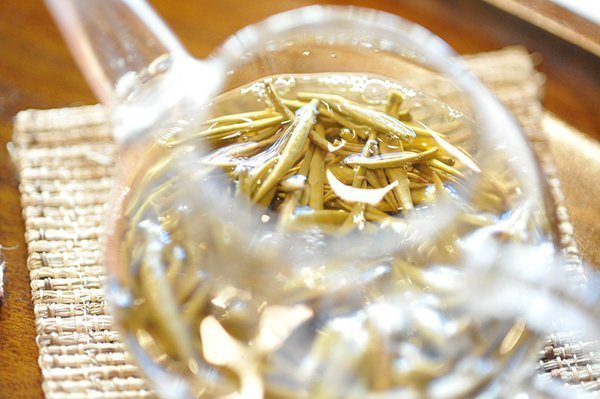
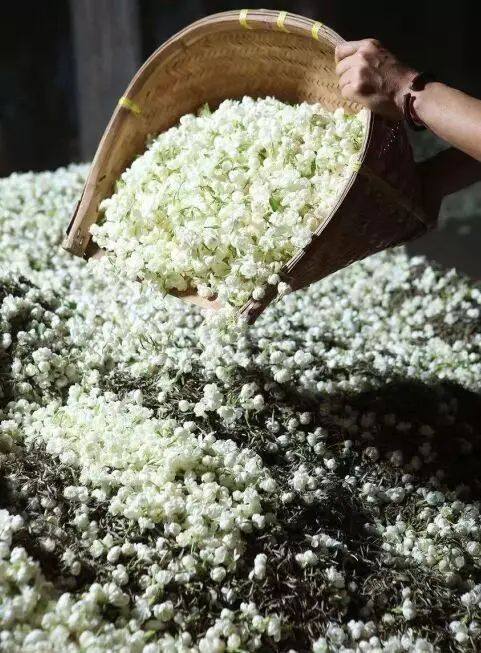
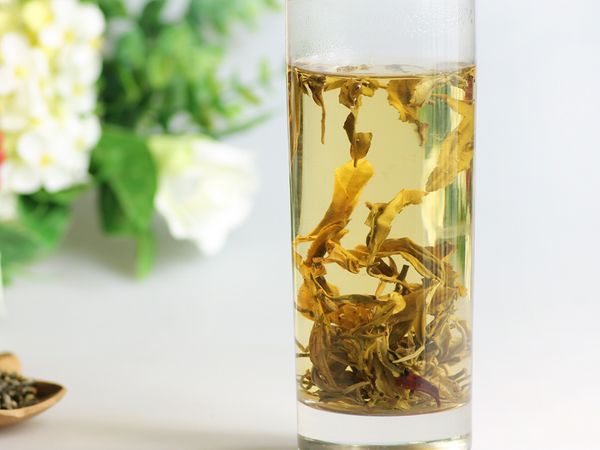
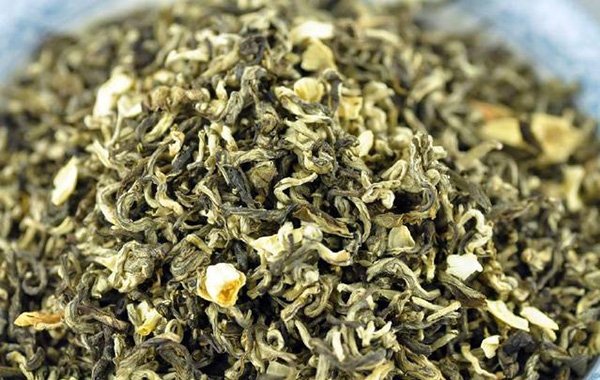
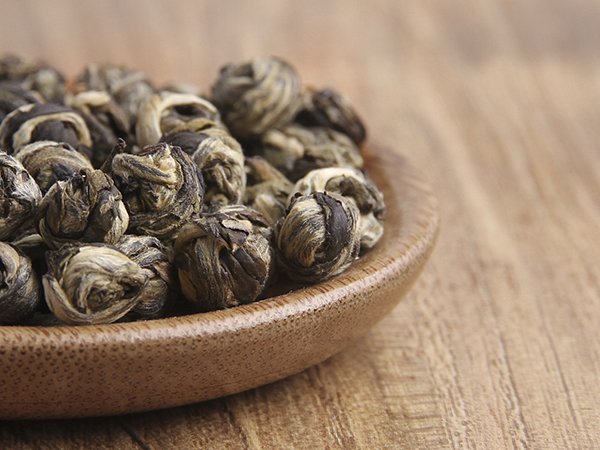
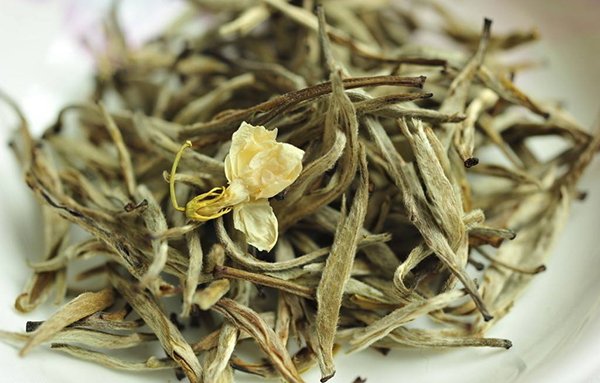
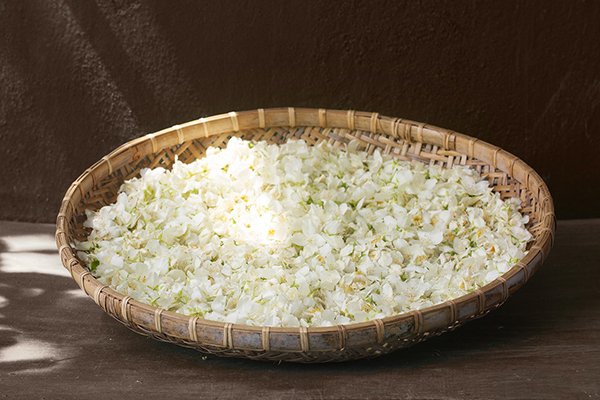
No comments:
Post a Comment